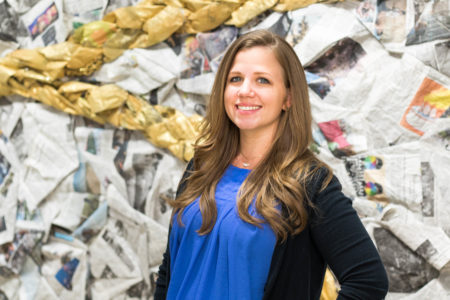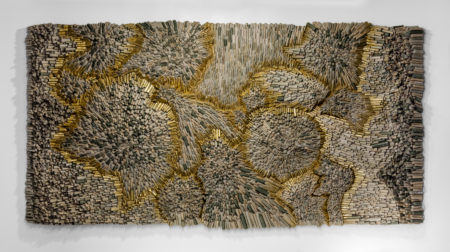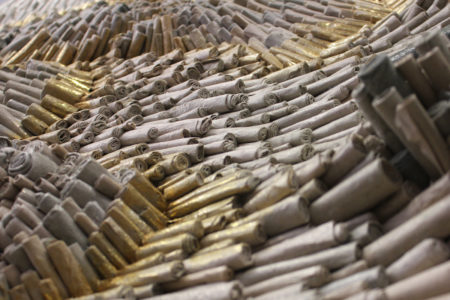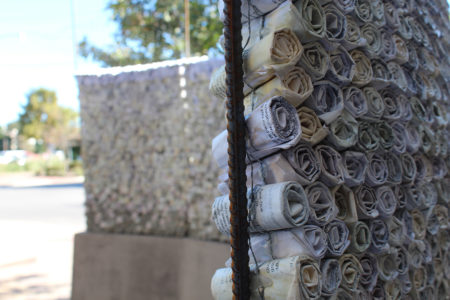With her intricate rolled-paper works, artist and veteran Jenn Hassin sparks discussion on national issues close to her heart.
By Rachel Rascoe, Photos by Cynthia Edith Zubia, C.S. Gray and Walter Wayman
 In the creation of her intricate paper-based artworks, Jenn Hassin meticulously imbues each step in the process with meaning. From creating handmade paper from clothing and uniforms to her group paper-rolling gatherings and symbolic pattern arrangements, Hassin doesn’t let any opportunities for significance slip through the cracks.
In the creation of her intricate paper-based artworks, Jenn Hassin meticulously imbues each step in the process with meaning. From creating handmade paper from clothing and uniforms to her group paper-rolling gatherings and symbolic pattern arrangements, Hassin doesn’t let any opportunities for significance slip through the cracks.
“The materials mean everything to me, as well as what I do with them,” Hassin says of her craft. “I’m trying to give as much importance to the piece as possible. Then the body of work has that connection to a group of people.”
Each layer of meaning adds up to Hassin’s big mission: to spark viewers’ recognition and exploration of current issues. Her previous meditative works have tackled issues such as war, veteran suicide, imprisonment and sexual assault.
“Lately, everything has been inspired by the sociopolitical issues in our country,” Hassin says of her subject matter. “I really care about certain things, and I want to make something to raise awareness about it. I guess that’s what makes it a little bit autobiographical for me.”
Hassin’s prolific interests in American policy, both at home and abroad, developed during her time with the U.S. Air Force, through which she was stationed as a dental technician in England. Hassin was raised in a military family and her older brother enlisted the day after the 9/11 attacks. Hassin followed soon after.
“As a veteran, I think of things a little differently, especially within the art world,” shares Hassin, who faithfully reads the Department of Defense report every morning. “I know more about foreign policy than I probably do about art, just because I’m invested.”
After completing her service, Hassin attended St. Edward’s University with the intention of becoming a dentist. An art class quickly shifted the direction of her studies, eventually leading to the creation of Hassin’s senior thesis project, “Letters of Sacrifice,” which now stands on display at the Pentagon. The poignant work memorializes the service members killed in action since 2001. The project marks Hassin’s first major exploration in her trademark rolled-paper style, which consists of folded condolence letters for each of the fallen soldiers. The sculpture grows as the artist periodically adds more scrolls to the wire structure.
“The reason why I roll is because it creates this spiral, which is a symbol of life to death, beginning to end,” Hassin says of her distinctive method, originally inspired by the practice of wedging folded prayers into Israel’s Western Wall.
The thesis undertaking forced Hassin to seek help with the labor-intensive coiling of thousands of letters. This led to her first group paper-rolling session, through which she was able to share her story as a veteran with other students while discussing media coverage of military deaths and the reasons for U.S. involvement abroad. Collaborative paper processing has since become a meaningful part of Hassin’s creative process, with meetings oftentimes held in her studio at Canopy Austin, the Eastside arts complex.
“It’s kind of like the sewing circle. You’re sitting around a table with all these people you don’t know, and you get to know them because you’re doing this mindless act of rolling paper,” Hassin says. “You can talk and hear other people’s perspectives, and it changes your mind.”
Hassin has since begun crafting handmade paper from fabrics relevant to her reflective topics. She sourced uniforms from every branch of the military and rolled with veterans for her project “A Battle Lost.” The textural work contains 8,030 rolls, one for each veteran suicide in 2014, shaped into abstract maps of U.S. war zones. She created “Targeted” in a similar vein during her artist residency at St. Edward’s, with 1,705 pieces crafted from orange uniforms representing the inmates at Texas’ Huntsville Unit prison.
The Austin-based artist’s interactive piece, “Receptacle,” can be viewed locally on the grounds of the Elisabet Ney Museum, where visitors can tuck their own scribbled thoughts and wishes into the structure. Hassin’s art is also on display in various exhibitions nationwide, including a recent large-scale project at Long Island University, where Hassin was able to share her advocacy-oriented message with students.
“I’m hoping that people, when they look at and engage with my work, can leave with an idea that they can start listening to other people’s ideas and perspectives and get a broader sense of how to make a difference with this issue,” Hassin says. “It’s not just raising awareness, but making a difference; not just the act of learning, but the act of doing.”




